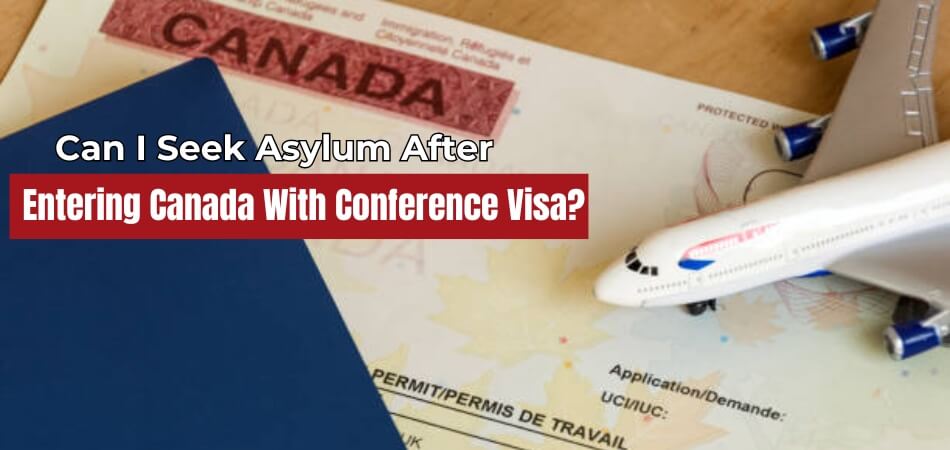You’ve just attended a business conference in Canada, networking and expanding your horizons. But amidst the professional hustle, a pressing question arises: “Can I Seek Asylum After Entering Canada With Conference Visa?”
Yes, you can, but it’s not straightforward. While possible, eligibility and procedures vary. Seeking legal counsel is essential to getting through this complex process effectively.
Here, we examine the intricacies of seeking asylum after entering Canada on a conference visa. Providing clarity and insight to empower your decisions and protect your rights, we unravel the nuances.
What is a Conference Visa?
A conference visa allows individuals to enter a country to attend professional events, workshops, or seminars. It provides access to industry-specific knowledge, networking opportunities, and global discussions. Applicants need to show proof of event registration, travel plans, and sufficient funds. Participating in a conference in Canada 2024 with invitation letter can strengthen your visa application and improve approval chances.

This visa is typically short-term, aligning with the event’s duration, plus travel time. It offers participants a chance to engage with experts and exchange ideas across industries. Depending on the country, additional documents like hotel bookings or travel insurance may be required. Staying compliant with visa conditions ensures a smooth and hassle-free experience.
Can I Seek Asylum After Entering Canada With a Conference Visa?
Yes, you can seek asylum after entering Canada with a conference visa, but the process is complicated. While it is legally possible, eligibility depends on several factors, including your circumstances and how you present your case. Consulting legal experts is essential to navigate the complex requirements and improve your chances of success.
Eligibility Based on Fear of Persecution
Applicants must demonstrate a well-founded fear of persecution if they return to their home country. The fear must involve serious threats based on race, religion, or political opinions. Without clear evidence, asylum claims can be denied by immigration authorities.
Having supporting documents strengthens the case, proving that the fear of persecution is legitimate. Legal guidance helps organize these documents for effective presentation. Failure to establish a strong case can negatively impact the outcome.
Timing of the Asylum Claim
Making the claim immediately upon arrival shows urgency and strengthens your case. Delayed applications may raise doubts about the legitimacy of the fear. Filing promptly also prevents complications with your temporary visa status.
While some people apply right after the conference ends, others may face risks with delays. Legal advice ensures proper timing without violating visa rules. Submitting your claim too late could hurt the credibility of your asylum request.
The Role of Legal Representation
Legal professionals help applicants understand complex asylum procedures and gather required evidence. They assist with preparing documents, translating, and understanding immigration laws. Good representation improves your chances of presenting a compelling case.
Legal counsel ensures the application aligns with Canadian immigration laws. Mistakes in the application process can delay or jeopardize approval. Professional support makes a significant difference in handling challenging legal matters.
Impact of Travel and Visa History
Canadian immigration officials may review your travel history when assessing your asylum claim. Inconsistent travel patterns or multiple entries could raise concerns about your intent. A clean visa history increases the credibility of your asylum case.
Being transparent about your travel history avoids complications during the asylum process. Legal advice helps address any concerns regarding past travel records. Officials look for honesty and consistency throughout your claim.
Adherence to Canadian Immigration Laws
Remaining compliant with visa conditions during your stay in Canada is crucial. Violating these terms can negatively affect your asylum application and result in penalties. Staying within legal boundaries reflects well on your case.
Legal experts help you manage both your conference attendance and asylum claim without breaking the law. Understanding these laws prevents unintended mistakes. A well-organized approach ensures you remain within the rules while seeking protection.
Risk of Claim Denial and Appeal Options
Not all asylum claims are successful, even for valid reasons. Applicants can appeal decisions through Canada’s immigration appeal system. Having a plan for potential appeals ensures you remain prepared.
Appeals require more evidence and legal representation to succeed. Consulting with a legal expert helps determine the best course of action. Being ready for all outcomes makes the process smoother.
How Long is the Wait for Conference Asylum in Canada?
The wait time for conference asylum in Canada can range from several weeks to three months. During this period, immigration officials review applications and conduct interviews to assess eligibility. Applicants need patience, as the process involves multiple steps and detailed background checks. Staying informed about timelines helps manage expectations and plan accordingly.
Some applicants explore options like changing a conference visa to work permit while waiting for asylum decisions. However, maneuvering both processes requires legal guidance to ensure compliance with immigration laws. Understanding these timelines allows applicants to remain organized and prepared. Timely follow-ups with immigration authorities can also prevent unnecessary delays.
What Benefits Do Asylum Seekers Get in Canada?
Canada offers a compassionate approach to asylum seekers, providing necessary support as they pilot their new environment. This assistance helps integrate them into society while respecting their basic rights and dignity. Below are some key benefits that asylum seekers receive upon arriving in Canada.
Healthcare Access
Eligible asylum seekers can receive medical coverage under the Interim Federal Health Program. This coverage includes essential and emergency services, like vaccinations and hospital care. It ensures they remain healthy during their asylum claim process.
Financial Assistance
To support basic needs, financial aid is available through federal or provincial programs. Asylum seekers may receive help for housing, food, and other necessities. This aid varies by province and individual circumstances.
Work Permits
Asylum seekers can apply for work permits while their claims are being processed. Gaining employment helps them become financially independent and contributes to local economies. This also allows them to build their new life in Canada more effectively.
Educational Opportunities
Children of asylum seekers have the right to attend school. Adults may access language training and other educational services to improve their employment prospects. Education helps them integrate better into the community.
Legal Assistance
Asylum seekers in Canada can receive legal aid to help pilot their claims. This support is crucial for understanding their rights and the complex legal procedures involved. It aims to ensure a fair process for all applicants.
Community and Social Services
Various programs support the social integration of asylum seekers. These include community centers, counseling services, and support groups that help them adapt to Canadian society. Engaging with the community eases their transition and reduces isolation.
Why Legal Advice Is Crucial for Asylum Seekers?
Sailing the asylum process can be incredibly complex, particularly for those who are not familiar with the legal system in a new country. Legal advice is essential for asylum seekers to understand their rights and the procedures that impact their futures. Here’s why having access to legal guidance is so crucial:
Knowledge the Process
Legal advisors help asylum seekers comprehend the intricate asylum application process. They provide clear explanations about each step, from applying to attending interviews and hearings. This knowledge is vital to manage expectations and prepare appropriately.
Protection of Rights
Lawyers ensure that asylum seekers’ rights are upheld throughout the legal proceedings. They also address concerns related to the safety of traveling to Canada after a conference for individuals needing asylum. They advocate on their behalf to prevent any form of mistreatment or denial of rights. This is especially important in scenarios where the applicant might face language barriers or unfamiliarity with local laws.
Enhancing the Chances of Success
Expert legal advice significantly increases the likelihood of a successful claim. Lawyers can help present a well-prepared case, highlighting the necessary elements to meet the criteria for asylum. They ensure that all the required documentation is accurate and compelling.
Dealing With Complications
Sometimes, cases may encounter unexpected issues, such as appeals against decisions or delays in the processing of applications. A seasoned lawyer cruises these challenges effectively, providing strategies to handle them and keeping the asylum seeker informed and prepared.
Emotional Support and Assurance
Besides technical legal help, lawyers often provide moral support. They help reduce the anxiety associated with the uncertainty of the asylum process. This emotional backing can be just as crucial as legal advocacy in maintaining the well-being of asylum seekers during this stressful time.
FAQs About Can I Seek Asylum After Entering Canada With Conference Visa
Seeking asylum in Canada after entering on a conference visa is a scenario that comes with many questions and considerations. It’s important to understand the specific requirements and legalities involved. Here are some frequently asked questions that can help clarify the process:
How Long Does the Asylum Process Take in Canada?
The duration of the asylum process can vary greatly, often taking several months to years. The timeline depends on the complexity of your case and the backlog of the immigration system.
What Are the Chances of Being Granted Asylum?
Success rates vary based on the specifics of each case, including the country of origin and the evidence provided. Legal representation and a well-documented claim enhance your chances.
What if My Asylum Application Is Denied?
If denied, you can appeal the decision within a certain timeframe. This appeal is critical and should be handled with the assistance of an immigration lawyer to address any issues raised in the initial decision.
Can I Work While My Asylum Claim Is Processed?
You may apply for a work permit once your asylum claim is referred to the Immigration and Refugee Board of Canada. This allows you to work and earn an income while waiting for a decision.
What Benefits Are Available to Me While I Wait for My Asylum Claim?
Asylum seekers in Canada may receive basic health care and, depending on the province, some form of financial aid to cover essential living expenses during the processing period.
Can I Leave Canada While My Asylum Claim Is Being Processed?
Leaving Canada during the asylum process is not recommended as it can jeopardize your claim. If you must leave, consult with your legal advisor to understand the risks and procedures.
What Happens After My Asylum Is Granted?
Once granted asylum, you become a protected person in Canada. This status allows you to apply for permanent residency and eventually citizenship, subject to fulfilling all residency requirements.
Final Thought
A conference visa requires expert guidance when dealing with the complexities of seeking asylum in Canada. The possibility exists, but it’s necessary to understand the eligibility criteria and legal process.
Can I Seek Asylum After Entering Canada With Conference Visa? is a common question that many individuals struggle with when considering their options. While it is possible to seek asylum with a conference visa, there are specific conditions and procedures that must be followed.
With the right support, you can direct the asylum process with clarity and confidence, ensuring your rights are protected every step of the way. You aren’t alone in this journey, and there are resources available to help you.







